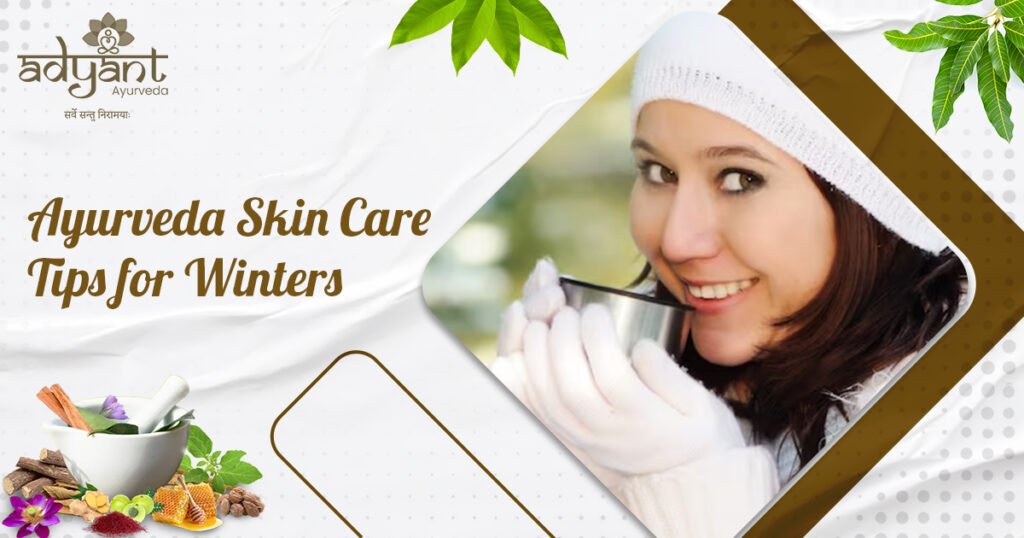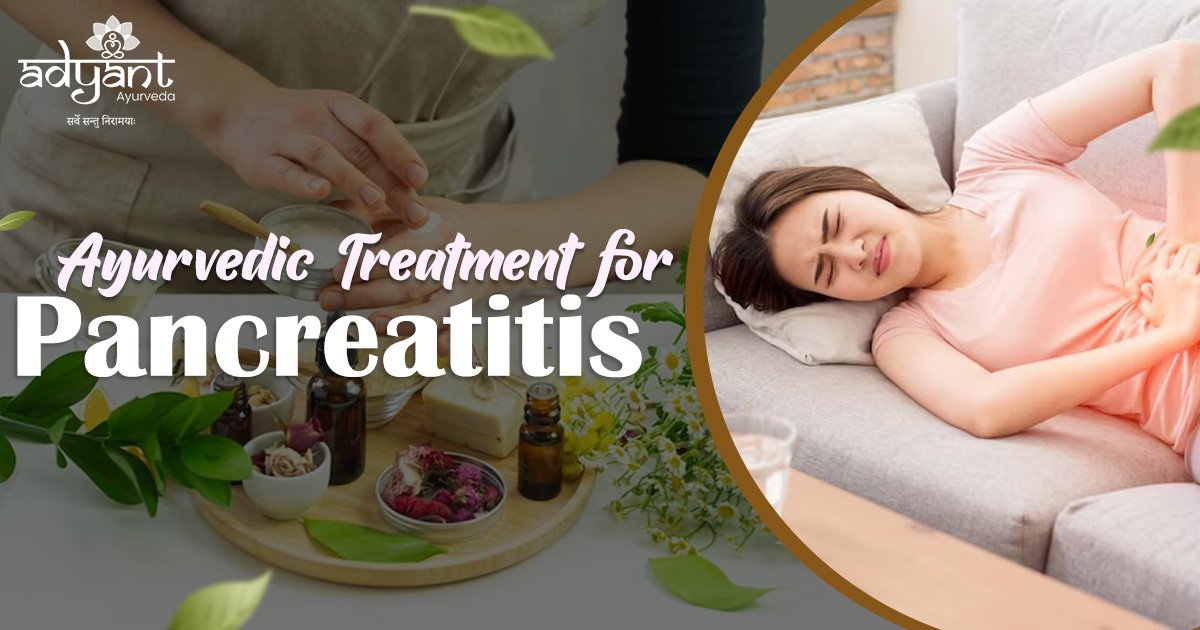Winter brings a magical transformation to the world, but it also ushers in challenges for our skin. The dropping temperatures, dry air, and harsh winds can wreak havoc on our skin, leading to issues such as dryness, flakiness, and irritation. Adyant Ayurveda, with its rich heritage in Ayurvedic practices, offers a holistic approach to skincare during the winter months. In this blog we will delve into Ayurveda skin care tips for winter, emphasizing precautions tailored to different skin types—Vata, Pitta, and Kapha.
Ayurveda Skin Care Tips in Winters:
Winter brings with it a host of challenges for the skin, as the cold and dry weather can lead to issues like dryness, flakiness, and irritation. Ayurveda, the ancient Indian system of medicine, offers holistic approaches to skincare that go beyond external applications. Here are some Ayurveda skincare tips for winter to keep your skin nourished and healthy during the colder months:
- Oil Massage:
- Ayurveda recommends regular oil massages during winter to nourish and protect the skin. Use warm sesame oil or almond oil infused with Ayurvedic herbs. This practice helps improve circulation, prevents dryness, and promotes a sense of relaxation.
- Stay Hydrated Internally:
- Hydration is key to maintaining healthy skin. Drink warm water throughout the day to stay hydrated from within. You can also include herbal teas like liquorice or ginger tea, which have hydrating properties.
- Protect Your Skin from Harsh Winds:
- Ayurveda recommends protecting your skin from harsh winds, which can aggravate Vata dosha. Use scarves and clothing to shield your skin when going out, especially if it’s windy. This simple practice can prevent excessive dryness and irritation.
- Herbal Face Masks:
- Create herbal face masks using Ayurvedic ingredients. For Vata skin, use a mix of honey and almond powder. For Pitta skin, try a mask with cooling ingredients like cucumber and mint. Kapha skin can benefit from a mask with clay and astringent herbs like neem.
- Balancing Doshas:
- Understand your predominant dosha (Vata, Pitta, or Kapha) and tailor your skincare routine accordingly. Vata types may need extra moisture, Pitta types should focus on cooling and calming ingredients, and Kapha types may benefit from detoxifying and invigorating treatments.
- Gentle Exfoliation:
- Exfoliation is essential in winter to remove dead skin cells and promote skin renewal. Ayurveda suggests using natural exfoliants like chickpea flour (besan) or oatmeal mixed with a little honey or milk. This helps in maintaining the skin’s natural glow without stripping away moisture.
- Moisturize Naturally:
- Instead of commercial moisturizers with synthetic ingredients, opt for natural oils. Coconut oil, sesame oil, or almond oil are excellent choices. Apply these oils on damp skin after a shower to lock in moisture.
- Avoid Hot Showers:
- While it might be tempting to take hot showers in the winter, Ayurveda advises against it. Hot water can deplete the skin’s natural oils, causing it to become more dry. Opt for lukewarm water instead and keep your showers brief.
Precautions According to Skin Type:
- Vata Skin:
- Lifestyle: Adyant Ayurveda advises those with predominant Vata dosha to follow a routine, ensuring adequate sleep and relaxation.
- Dietary: Warm, grounding foods such as root vegetables and whole grains are beneficial and warm water intake should be increased.
- Pitta Skin:
- Lifestyle: Pitta skin types should avoid excessive exposure to the sun and heat. Adyant Ayurveda recommends engaging in calming activities such as meditation and gentle yoga.
- Dietary: Cooling foods like cucumber, mint, and coconut are advised. Hydration is crucial, and spicy or fried foods should be limited.
- Kapha Skin:
- Lifestyle: To balance Kapha dosha, regular exercise and invigorating activities are encouraged. Adyant Ayurveda recommends dry-brushing the skin to stimulate circulation.
- Dietary: Light, warm foods with spices like ginger and black pepper are beneficial. Avoiding heavy, oily foods is crucial for Kapha skin types.
Essential Oils in Ayurveda Skin Care:
Lavender Oil:
Known for its calming properties, lavender oil is recommended for all skin types. It helps soothe irritated skin and promotes relaxation.
Ksheerabala Oil:
For its anti-ageing benefits, this oil is rich in antioxidants and essential fatty acids, it rejuvenates the skin and helps reduce fine lines.
Tea Tree Oil:
With its antimicrobial properties, tea tree oil is advised for acne-prone skin. By diluting it with a carrier oil for effective application.
Conclusion:
By understanding individual doshas and following personalized routines, one can achieve a harmonious balance, resulting in radiant and healthy skin. The integration of Ayurvedic principles, nourishing dietary habits, and the use of essential oils makes Adyant Ayurveda a beacon of wisdom for those seeking the best Ayurveda treatment for skin during the winter months. Embracing these holistic practices not only protects the skin from external elements but also fosters overall well-being in the mind and body.
FAQs
- Why is an oil massage (Abhyanga) recommended during winter, and what oils are best for it?
An oil massage is recommended in winter to nourish and protect the skin. Warm sesame oil or almond oil infused with Ayurvedic herbs is commonly suggested. This practice improves circulation, prevents dryness, and induces a sense of relaxation.
- How can I stay hydrated internally according to Ayurveda during the winter months?
Ayurveda recommends staying hydrated by drinking warm water throughout the day. Additionally, herbal teas like liquorice or ginger tea, known for their hydrating properties, can be included in your daily routine.
- What precautions does Ayurveda suggest for protecting the skin from harsh winter winds?
Ayurveda advises protecting the skin from harsh winds, which can aggravate Vata dosha. This can be achieved by using scarves and appropriate clothing to shield the skin when going out, especially in windy conditions, preventing excessive dryness and irritation.
- How can I create herbal face masks based on Ayurvedic principles for my specific skin type?
Herbal face masks can be tailored to your dosha. For Vata skin, a mix of honey and almond powder is recommended. Pitta skin benefits from cooling ingredients like cucumber and mint, while Kapha skin can use masks with clay and astringent herbs like neem.
- What dosha-specific precautions should be taken in terms of lifestyle and diet during winter?
Depending on your dosha, lifestyle and dietary adjustments are recommended. Vata individuals should follow a routine and consume warm, grounding foods. Pitta types should avoid excessive sun exposure and favour cooling foods, while Kapha types benefit from regular exercise and light, warm foods.
- Why does Ayurveda discourage hot showers in winter, and what alternatives are suggested?
Hot showers can deplete the skin’s natural oils, causing increased dryness. Ayurveda advises against them and recommends opting for lukewarm water instead. Keeping showers brief helps prevent excessive drying of the skin.









